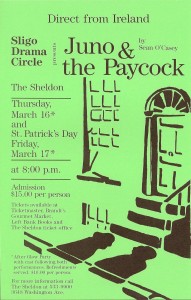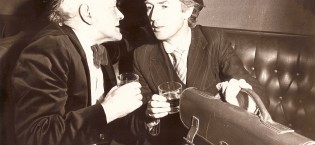Sligo Drama Circle Acclaimed In St. Louis
 Sligo Drama Circle members have just returned from the United States following a much acclaimed performance in St. Louis, Missouri, of the Seán O’ Casey classic “Juno and the Paycock”. The St Louis Post-Dispatch newspaper, in a review, described the Sligo group’s production as “good – often very good”. The newspaper’s theatre critic, Joe Pollack, stated that if ever a play proved that those who failed to learn from history were doomed to repeat it or that the more things change the more they remained the same, it was “Juno and the Paycock”, the classic drama by Seán O’ Casey. It was set in 1922 but more than three generations later Irishmen were still fighting Irishmen and grinding poverty still had the nation in turmoil. The review continued: “The Sligo Drama Circle from the Irish community of the same name brought the play to the Sheldon and while the accents sometimes caused difficulty, the message of the play was loud and clear and the production was good – often very good”.
Sligo Drama Circle members have just returned from the United States following a much acclaimed performance in St. Louis, Missouri, of the Seán O’ Casey classic “Juno and the Paycock”. The St Louis Post-Dispatch newspaper, in a review, described the Sligo group’s production as “good – often very good”. The newspaper’s theatre critic, Joe Pollack, stated that if ever a play proved that those who failed to learn from history were doomed to repeat it or that the more things change the more they remained the same, it was “Juno and the Paycock”, the classic drama by Seán O’ Casey. It was set in 1922 but more than three generations later Irishmen were still fighting Irishmen and grinding poverty still had the nation in turmoil. The review continued: “The Sligo Drama Circle from the Irish community of the same name brought the play to the Sheldon and while the accents sometimes caused difficulty, the message of the play was loud and clear and the production was good – often very good”.
The Sligo group arrived back at Strandhill Airport following their trip which lasted from March 9th to the 18th during which they experienced boundless hospitality. “The interest in and enthusiasm for anything Irish during St. Patrick’s week might be expected but the availability of an O’ Casey classic with all Irish (and all Sligo) cast was unique for both the Sligo Drama Circle and the appreciative American audiences,” said Mr. Seán Burke. During their visit, Sligo Drama Circle participated in the St. Patrick’s day Parade in their specially designed Drama Circle sweatshirts. “Sligo might have been far away but the massive newspaper, radio and television publicity made everybody in the S.D.C. company so proud and so determined to do Sligo proud, none more so than director, Walter Mc Donagh,” said Mr. Burke.
The St. Louis Post-Dispatch review stated that it was depressing to realise how much remained the same either in truth or in perception, but it was exciting to listen to O’ Casey’s words coming from actors who were part of the land and the heritage. “The story is basic: the Boyle family, deep in poverty, includes father, mother, son and daughter. Jack is a loafer, his wife, Juno, tries to keep things together, son Johnny is crippled from battle wounds in “the troubles”, daughter Mary is on strike. Suddenly, like an announcement from heaven, Boyle is told he will receive an inheritance of as much as 200 pounds. Betting on the come, the family buys furniture, clothes and booze, living it up to the highest. The comedown is savage: the inheritance vanishes through a legal error, the son is executed for being an informer, the daughter is made pregnant by the man who promised the inheritance, seduced her and left town”.
The review added: “Eddie Mac Dermottroe is splendid as Jack Boyle, known as the Paycock (peacock) because of his pride. His problems are largely of his own making. He’s proud and lazy and not nearly as bright as he thinks he is, and an “old fashioned man” in terms of dominating – even bullying – his wife and children. Mac Dermottroe’s lilting strut, his sudden rages, his drunken rantings, are outstanding. He has a perfect match in Lionel Gallagher as Joxer, his neighbour and drinking companion. Joxer is the ultimate sycophant, always turning his face to the kind word, his hand to the full glass, and Gallagher is just wonderful. He is smarmy s he glides across the floor, wormy as he insinuates his great friendship for the Paycock, two-faced as he snarls invective at the Paycock behind his back, lower than low as he steals his last bottle of beer. It’s a rich and superior performance.
Ann Mc Dermott, as Juno, doesn’t have the opportunity for flamboyance that Mac Dermottroe and Gallagher have, but she help hold the play together even as she fails to hold her family together. She’s solid and impressive. Ita Mc Morrow was the other standout as a blowzy-blonde neighbour who makes the most of he appearances”, the review said. The Sligo group’s visit to St. Louis was not only successful, but it will go down as one of the major all-time highlights in Sligo Drama Circle’s history.
from The Sligo Champion, April 7th, 1989
Tags: History, Press Reports, Productions, Seán O' Casey, St. Louis







